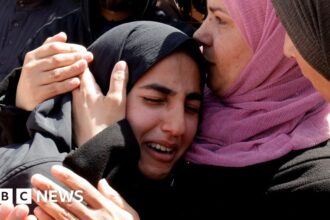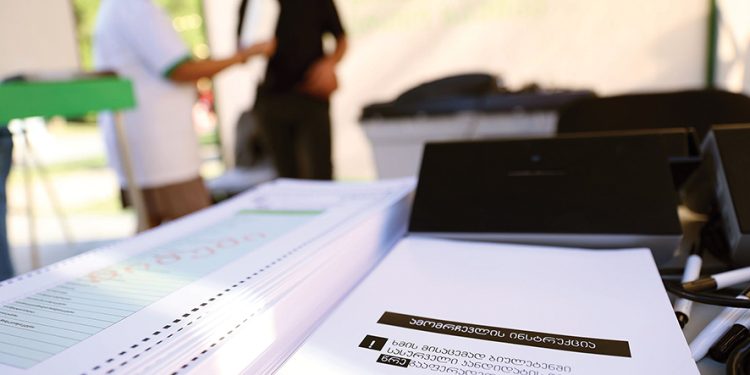As Georgia prepares for its parliamentary election on October 26, major parties are releasing their pre-election plans. Each party has a unique vision of the future for the country. They focus on key areas like economic growth, social welfare and education, infrastructure, foreign policies, and governance. This article presents a comprehensive analysis of the plans and goals of the major political parties including Georgian Dream and Strong Georgia.
Georgian Dream: Economic Growth and Infrastructure Development
Georgian Dream, the ruling party in Georgia, presented a comprehensive and ambitious pre-election campaign on October 7. The presentation was led by Prime Minister Irakli Kobakhidze and lasted more than an hour. It laid out a variety of strategic goals in multiple sectors and compared the current political climate to that of 2012 when the party came to power. The party’s honorary chair, Bidzina Ivanishvili and chairman Irakli Garibashvili were both conspicuously absent from the event, leading to speculations about their roles in the party’s efforts to galvanize its support in the face of ongoing political challenges.
Kobakhidze highlighted the projected growth of Georgia’s economy, predicting that it would reach 130 billion GEL at least by 2028. This economic expansion will generate a budget of more than 50 billion GEL. The Prime Minister claimed that the unemployment rate has been reduced by half since 2012. His ambitious goal is for the unemployment rate to be further reduced to 4% by the year 2028. This would place Georgia below the European average.
Infrastructure development is at the core of Georgian Dream. Kobakhidze announced plans for a major upgrade to the country’s roads, including the opening a new four lane highway from Tbilisi-Batumi. The development of the Anaklia Port is expected to revolutionize the trade by allowing it to handle 600,000.00 containers annually by 2029. A new airport in Vaziani, which is expected to handle up to 18,000,000 passengers, will enhance Georgia’s transport capabilities.
The party will also invest 3 billion GEL over the next four-year period in agriculture, building on Ivanishvili’s earlier promises of revitalizing rural areas. Kobakhidze stressed that this investment would surpass previous financial commitments made to the agricultural sector. The Georgian Dream envisions energy self-sufficiency in Georgia by 2030. Plans include increasing the power generation from 4,600 MW currently to over 10,000MW by 2030 through the construction 63 hydropower stations, as well a variety of thermal and wind power installations.
The program also focuses on education and healthcare. The Prime Minister has promised to expand the educational infrastructure including the development Kutaisi International University, and a new Tbilisi State University campus. Kobakhidze promised to build a new republican health facility and to increase pensions by 350-450 GEL. The program for social services, especially civil servants, includes salary increases. Special attention is given to staff at kindergartens and art school.
Kobakhidze has given a lot of attention to cultural initiatives, announcing he would allocate 30 million GEL for the support of artists and increased funding for sports. A new stadium that can accommodate 70,000 spectators, and is designed to accommodate both rugby and football events, is also being planned. The goal is to host the Champions League in 2028.
Georgian Dream’s foreign and defense policy aims to improve the social conditions of military and police personnel while bolstering the national military industry. Housing and infrastructure improvements for police officers and soldiers are the focus of significant investments. Kobakhidze emphasized the need to reset the relations with the United States, the European Union and Russia. He also advocated for a pragmatic, peaceful approach towards Russia. He expressed his confidence that Georgia would be in a good position to join the EU by 2030.
“Strong Georgia Presents “Ilia’s Way”.
“Ilia’s Way”, a nine-point strategy, is designed to implement EU recommendations quickly and expedite the membership negotiations after the election.
“Ilia’s Way”, a strategy based on implementing recommendations from the European Union, aims to accelerate EU membership negotiations as soon as the elections are over. The “Georgia Protection Act” is a key component of this vision, which aims to limit the influence of Russian citizens in Georgian society and prevent foreigners from buying land. “Strong Georgia”, which aims to protect the country’s sovereignty by reinstating visa requirements and tightening border controls, aims at achieving a stable European future.
“Strong Georgia”, in addition to these protective actions, is committed to improving the quality of life for all its citizens. The coalition intends to raise pensions up to 1000 GEL and ensure that this amount is annually adjusted for inflation. This initiative aims to allow elderly citizens to live in dignity and security. This increase will be funded by a realistic budget that is geared towards the citizens and focuses on economic growth, reducing corrupt practices, and increasing taxes on the gambling industry.
The coalition is also committed to creating 200,000 jobs through major infrastructures projects such as Anaklia Port, which have been delayed for years. “Strong Georgia” is committed to developing infrastructure that meets European standards and driving economic growth for all Georgians. The plan also includes paid internships to help graduates gain valuable experience and make a smooth transition into the workforce.
Coalition for Changes – Commitment to Reform
Zura Japaridze, in a vision that was radically different, unveiled on July 25 the “Coalition for Changes”, a comprehensive strategy centered on four main directions: adherence the Georgian Charter; rapid economic development; education reform and regional empowerment. This coalition emphasizes the Georgian Charter which is aligned with the nine recommendations of the European Commission aimed at facilitating Georgia’s negotiations for EU Membership. Japaridze said that the coalition is committed to making concrete promises and delivering on them, positioning itself in this regard as a leader.
The Coalition’s program includes the goal of doubling the economy of the country. Japaridze said that this growth would be the foundation for wider changes, especially in budgetary reforms. The coalition wants to create an environment that encourages rapid economic growth, and improves the quality of life of citizens. Japaridze expressed his desire to modernize Georgia’s education system in a significant way. This initiative focuses on deregulating private educational institutions to the maximum extent possible, creating a competitive environment which encourages quality improvement. While public education will continue, incorporating free market principles is seen as a way to raise educational standards without heavy government intervention.
The coalition stresses the importance of decentralizing governance and empowering local regions. Japaridze argued the decision-making process should not be left to the central government, but instead empower local leaders. This approach is designed to promote market dynamics and self-governance by empowering regions to take control of their own development. Japaridze’s speech, as the Coalition for Changes prepares for the upcoming electoral campaign, outlines a vision for an economically prosperous and democratically self-sufficient Georgia. It is intended to resonate with voters who are looking for meaningful change.
Unity – National Movement : European Integration and Social Welfare
The Unity-National Movement has outlined their priorities, demonstrating a strong commitment towards European integration. They have advocated for an EU passport as well as secured EUR14 billion of European support for the national reconstruction. The program promises visa free travel to the USA as well as the establishment of a independent anti-corruption agency under EU supervision. Their economic agenda is centered on the goal of a salary average of 3,500 GEL. A minimum salary of 1,500 GEL will also be included, as well as a basic allowance for rural residents and displaced people of 300 GEL. They also propose a guaranteed retirement savings plan for immigrants, supported the Mikheil Saakashvili Foundation which intends to spend EUR1 billion on their return.
The program places a high priority on protecting pensioners. The coalition intends to cancel pension loans by December 1, 2020, and promises a 1,000 GEL pension for pensioners, veterans, and disabled individuals. In addition, the coalition proposes to provide subsidies for medicines to help this vulnerable population. The coalition’s fourth priority is to support families by providing monthly financial assistance for newborns, high-quality kindergarten provisions, and free meals at school for all children. They want to set a minimum wage of 2,000 GEL per teacher, along with housing initiatives for outstanding teachers and subsidized rental for students. The coalition also pledges that it will fight the drug mafia by focusing on resocialization, and caring for users.
The Unity-National Movement also aims to eliminate monopolies in various sectors and cut bank interest rates in half. They plan to reduce administrative costs and fines, promote Georgian products, and set up enterprises in all regions. This is backed by an EUR1 billion EU subsidy. The Unity – National Movement, through these priorities, presents a comprehensive vision aimed to secure Georgia’s European Future, enhance economic stability, protect vulnerable populations, and foster family well-being.
Girchi: A Call for Radical Reforms
The Girchi Party presents a radical new approach. It aims to create a rich, fair society by introducing significant reforms to the economy, judiciary, and political system. Their program includes ambitious plans to empower citizens and promote equality. Girchi is a proponent of equal and free distributions of state-owned properties, pointing out that 90% of Georgia’s resources are owned by the state and are largely underutilized. Their plan includes an elaborate project called “Return of Land, Water and Country” which aims to make sure that all citizens are able to benefit from these resources.
Girchi proposes an Universal Basic Income (UBI), which would provide each citizen with a monthly payment around 500 GEL. The goal is to eradicate extreme poverty. Girchi proposes a multi-currency system to combat inflation. This would allow citizens to transact using multiple currencies and provide an alternative to the national money if it devalues. They also demand the return of pension funds to citizens and abolish the pension contribution scheme, which they perceive as a fraud.
Girchi’s second priority is tax reduction. They focus on eliminating burdensome taxes that affect the poor, and introducing an equitable tax system to promote economic growth. They propose a distribution of National Bank Reserves amounting to $1200 per citizen in order to ease financial strain. The party stresses individual property rights and proposes that landowners own their land in its entirety, including airspace above it and minerals below. This would remove restrictions on the use of property and empower citizens to manage assets as they choose.
Girchi proposes major reforms on the judicial front. This includes a large-scale Amnesty in order to correct injustices within the current penal system. They believe that it is outdated and unfair. They support electing judges and jury members to ensure a more reliable judicial process. They also advocate for a revision of the Criminal Code that would decriminalize acts without direct victims. To increase accountability, they propose that local police chiefs are elected by their respective communities, creating a law enforcement system responsive to the public.
The Girchi program emphasizes educational autonomy and calls for the abolition the Common National Curriculum. They believe this would allow schools the freedom to develop their own educational methods, promoting diversity and better matching education with community needs. Their defense policy advocates for a transition from a military based on volunteers to one that is more aligned with NATO.
For Georgia: Stability, Social Support
For Georgia, led by Giorgi Gakharia (former Prime Minister), has a program that aims to achieve a future of “real peace, dignity and prosperity”. Gakharia’s vision includes significant social welfare initiatives such as the establishment of a minimum wage of 950 GEL, and substantial support for those who are unemployed. The party wants to improve employment prospects by allocating 300 million GEL per year for employment support programs. It will focus on women and young people.
Gakharia’s Party places a high emphasis on reforming education. Their program aims to increase vocational training opportunities, improve infrastructure for regional development and ensure that all villages will have access to essential services such as gas, drinking water and fast internet by the year 2028. They want to provide free meals for all students and improve the quality of early childhood education by investing heavily.
For Georgia also places a high priority on economic stability. The program focuses on controlling inflation and providing long term, low interest financing to entrepreneurs to foster an environment conducive for business growth. Gakharia’s plan includes the creation of an independent anticorruption agency to ensure effective governance. This is seen as essential to restoring public confidence in government institutions. This agency will be in charge of monitoring corruption and holding those accountable who abuse public resources for personal gain.
The program also emphasizes the need for an amnesty that is fair, along with stronger actions against organized crime as a way to promote a stable and secure society. Gakharia stresses the importance of addressing territorial integrity issues and advocates for EU Membership as a strategic objective that would strengthen Georgia’s position in negotiations against Russia.
Conclusion: A Diverse political Landscape
Georgia is at a crossroads as the elections near. Each political party has its own vision and proposals for the future. The stakes are high and the decisions taken at the ballot box could have lasting effects on the country’s social, political, and economic landscape. Georgian Dream’s ambitious infrastructure plans and economic projections are reflected in Girchi’s grassroots empowerment strategies. Each party has a unique approach to navigating the challenges ahead.
The Coalition for Changes, Unity – National Movement, as well as For Georgia, also contribute important ideas, focusing mainly on European integration, education reform, social welfare, and economic stability. Voters will be presented with a variety of proposals, each promising to take Georgia in a new direction, and ultimately shape the future of the nation for years to come. As citizens prepare to vote, the discourse around these programs will undoubtedly be a crucial factor in determining Georgia’s next chapter on its journey towards prosperity and democratic governance.
Read More @ georgiatoday.ge












